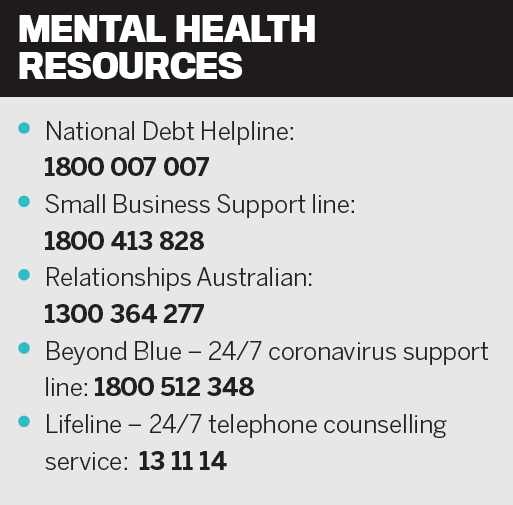With a strategy for ensuring that mental ill-health is not a barrier in the workplace, Westpac has some tips and encouragement for mortgage brokers who might be struggling with their own mental health, or that of their clients

The sustained disruption caused by COVID-19 has impacted millions of people’s lives across Australia, and with that comes a strain on mental health. In fact, last month, Lifeline recorded its highest-ever number of calls in one day, with 3,345 calls made to the organisation on 3 August.
But as brokers continue to work with borrowers who may be in difficult financial situations during the pandemic, major bank Westpac reminds them that they are not psychologists and therefore are not expected to counsel their clients.
It’s not just borrowers who are struggling with their mental health; having conversations with these borrowers can take a toll on brokers’ mental health as well. Not to mention the stress of running a business, particularly during a pandemic and with financial worries of their own, while facing long hours and often lonely stretches of time.
Westpac has a workplace mental health strategy based on the notion that mental ill-health does not discriminate or preclude someone from being a great contributor or performer. It works to improve the psychological health and safety of its workforce through best practices and education.
“The pandemic has accentuated the importance of investing in our mental health and wellbeing and has encouraged a proactive movement across the mental health domain,” says Westpac Group’s mental health officer, Katie Botha. “People are continuing to recognise that it’s OK not to be OK, and an increase in stress levels, concern and anxiety are all very normal human reactions to an exceptionally abnormal situation.
“The more we recognise this, the better we can become at supporting each other and encouraging early help-seeking behaviors when people encounter significant life events, or when we see emerging signs of compromised mental health and wellbeing.”

Supporting borrowers’ mental health
If a broker does identify any situational stressors or changes in a customer’s typical behaviour – or indeed, that of one of their colleagues – Botha says it’s important to acknowledge the concern and have an open conversation, but then refer them to a professional support service.
Brokers are in an important position for early identification and intervention at the first signs of potential vulnerability, she says.
“Often brokers are engaged for financial support when a person experiences a significant life event, such as health concerns, a partnership breakdown, the birth of a new family member, or other significant life stressors,” she says. “Therefore, if brokers can identify that a customer is experiencing a significant stressor, they have the opportunity to proactively connect that person with additional support resources.”
But what should brokers look out for?
Botha says considering the borrower’s situation is the first step. Adverse and challenging life events affect people in different ways, and financial concerns can have an amplifying effect. For example, the birth of a child might be something to celebrate, but there are additional stressors that can come along with it.
There are also behavioural changes that brokers can look out for: the customer might be withdrawn or disengaged, their mood might be fl at or overexaggerated, their use of language might change, they might experience cognitive difficulties, or their responsiveness to calls and messages might increase or decrease.
If brokers are encouraged not to be counsellors, what can they do in their conversations with borrowers?
Botha says brokers should ask open questions to encourage the customer to talk to them, and then respond in an empathetic way without assuming they know how the customer feels.
“Rather than saying, ‘I understand’, try saying, ‘I can’t imagine what you’re going through’ – this shows a strong level of empathy for the customer,” Botha says.
With this empathy, brokers can suggest online and phone support options.
Looking after your own mental health
To brokers having those conversations with clients, Botha says: “Don’t be hard on yourself. These conversations can be challenging, but they’re extremely important, and often your good intentions will show through.”
She adds that it’s vital to “care, not carry”. Having these conversations with borrowers can be difficult, but brokers should also be prioritising their own mental health and wellbeing, and not just when they are not at their best or might be struggling.
“The more we prioritise our own wellbeing, the better we’re able to face the challenges we’re experiencing during the ongoing COVID-19 pandemic,” Botha says.
One step brokers can take is to go “back to basics”: prioritise sleep, eat a well-balanced diet, exercise, and make sure they are maintaining social connections (even if only virtually). Take time to do the things you love, like reading a book, listening to a podcast, or spending time with household contacts, Botha suggests.
Reminding brokers that “none of us are invincible”, Botha encourages them to remember that it’s important to maintain work-life boundaries. She recommends implementing a regular work routine and engaging in end-of-day activities to help them switch between work time and personal time.
“Remember to be kind to yourself. It’s OK to feel flat, it’s normal to feel frustrated and annoyed by current COVID-19 events, but also if you feel like you’re thriving in the current environment, that’s OK too,” Botha says. “However, if you feel yourself increasingly unable to manage, don’t go it alone. Reach out and remember that early help-seeking behaviour always leads to better outcomes.”



